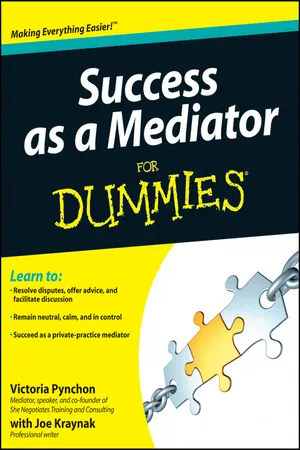Part I
Acquiring the Keys to Mediation Success
In this part . . .
To become a master mediator, you need to start by being a mediator, and that’s what this part is all about. Here I paint a picture of what success as a mediator looks like and describe some of the paths you can take to achieve that goal. I also assist you in selecting a mediation market that’s right for you and in obtaining the required training to pursue that market.
In short, the chapters in this part ensure that you build a successful practice on a firm foundation.
Chapter 1
Achieving Success as a Mediator
In This Chapter
Deciding whether you have the skills and personality to be a mediator
Finding career opportunities in mediation
Acquiring essential mediation skills, training, and education
Launching and marketing your mediation business
Ask a dozen people what success means, and you’re likely to get a dozen different definitions. For some, success means lots of money. Others define it in terms of happiness or freedom from worry. For others, success means spending quality time with loved ones. When focusing on success as a mediator, however, the word means two things:
You’re good at facilitating dispute resolution.
You earn enough money to make mediation your career or, at a minimum, a significant source of new income.
To be a great mediator, you need to master the skills, techniques, and strategies required to assist parties in resolving their disputes. To earn enough money to make mediation a worthwhile career, you need to market yourself and network in ways that attract clients who can pay what your services are worth.
This book is dedicated to empowering you to achieve success as a mediator in both areas. This chapter serves as the CliffsNotes version, getting you up to speed in a hurry.
Do You Have What It Takes?
Not everyone has the makeup to be a mediator. Some people lack patience, are uncomfortable with conflict, or are unable to remain impartial. Others lack essential abilities, including critical thinking, problem-solving, and communication skills. Sure, you can develop some of what you may lack through education, training, and experience, but much of what’s required to be a mediator is born and bred — it has to do with personality and attitude. In the following sections, you take a personality and skills inventory to see whether you have what it takes to be a master mediator.
Assessing your personality
Some people prefer to work in relative isolation, never having to deal with the messiness of human interaction and relationships. They focus on the task at hand and accomplish a great deal. The world needs people like that, but mediation doesn’t. To be a great mediator, you need to be good with people, and that means having the following personality traits:
Emotional stability/maturity
In short, you need to genuinely like people and enjoy helping them solve their problems and get along with one another.
Taking inventory of your skills
In an emergency, people with relevant skills tend to be more helpful than the average Joe. Doctors, nurses, emergency medical technicians (EMTs), police, and firefighters have the skills, equipment, and experience necessary to respond to disaster and help the victims. Those without the skills required for the task tend to just get in the way. Similarly, you need a few fundamental skills to help parties in dispute, which is a crisis in human interaction, including the following:
Interviewing: You should possess the ability to ask open-ended, curiosity- driven questions and to follow up those questions with more inquiries to elicit detailed narratives along with the emotions and subjective perceptions driving the conflict story. If you’re naturally curious about people and what motivates their behavior, you’re probably good at interviewing people.
Critical thinking: You must have the ability to figure out what’s really bothering each party by breaking down problems into discrete issues and helping the parties problem-solve those issues in light of their conflicting or overlapping interests.
Creative problem-solving: Mediation is often more than just figuring out how much of the pie each party is entitled to. It’s about identifying each party’s interests or needs and matching them up with the available resources.
Communication skills: You need to be able to communicate orally, in writing, and in nonverbal ways.
Nonverbal means without words, through body language. You must be able to pick up on what certain postures and facial expressions mean and to communicate confidence and optimism through your own body language.
Choosing Your Path
The paths that lead someone to a career in mediation are too varied and numerous to describe. Attorneys weary of litigation often pursue mediation as a more attractive alternative. Educators may go into mediation to help parents and school systems resolve their disputes. Healthcare providers may enter the field to help patients and doctors resolve malpractice claims outside the courtroom.
Generally speaking, however, two paths lead to a career in mediation, and the path you take requires that you learn or unlearn what you already know:
From attorney to mediator: As an attorney, you need to unlearn what you already know about dispute resolution and embrace a collaborative rather than adversarial approach. In mediation, disputes are no longer about rights and remedies or who’s wrong and who’s right. Disputes are opportunities to locate and allocate available resources to provide the parties with as much of what they want as possible and, in some cases, to mend the relationships damaged by the dispute.
From non-attorney to mediator: If you’re not an attorney, you need to get up to speed on the basics of the law and legal process whether or not the dispute is being litigated, because the parties’ right to sue each other is often the better (or worse) alternative to a negotiated resolution. You also need to learn what you may and may not legally do or say as a mediator working with parties whose dispute is, or may be, the subject of a lawsuit.
In either situation, Chapter 5 eases the transition.
Checking Out Mediation Opportunities
As a mediator, you can choose to ply your trade in a variety of ways. You may want to specialize in litigated or nonlitigated cases, pursue an opportunity in a court-annexed panel, seek out prospects in the public sector, or even go global with international diplomacy. Here’s a short list of the many possibilities:































